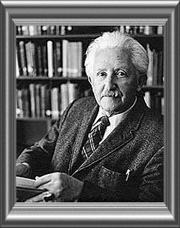 Eric Erikson
Eric Erikson 
Ψ In an extension of Freud's theory, Erik Erikson proposed eight successive stages of development from infancy through old age, each stage involving a crisis that must be solved.
|

|
1. Trust versus Mistrust (infant 0-1) - Hope is the virtue that develops upon successful resolution of this stage. else wise: withdrawal may occur. Unresolved: suspicious of others,
making close relationships difficult.
2. Autonomy versus Shame & Doubt (toddler 2-3) - Will / compulsion
Unresolved: Obsessively driven, single-minded, not socially responsive.
3. Initiative versus Guilt (preschooler 3-6) - Purpose / inhibition
Unresolved: fearful, regretful.
4. Industry versus Inferiority (school age 7-12) - Competence / inertia
Unresolved: self critical of any endeavor,
procrastinating, perfectionistic.
5. Identity versus Role Confusion (adolescence, 12- 20) - Fidelity / repudiation
Unresolved: uncertain & negative about values, lifestyle, friendships.
6. Intimacy versus Isolation (early adulthood, 20 - 40) - Love / exclusivity
Unresolved: anxious about closer relationships, jealous, lonely.
7. Generativity versus Stagnation (middle adulthood, 40 - 65) - Care / reflectivity
Unresolved: fear of failure
8. Integrity versus Despair (late adulthood, 65 +) - Wisdom / distain
Unresolved: no life plan, lack of awareness of personal responsibilities.
Growth & Development
Robert C. Gates

|
|








